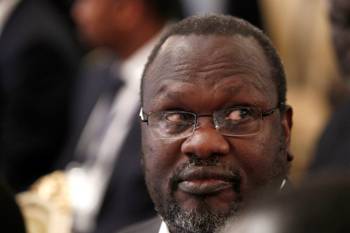Juba resolutions a slap in the face to peace process: rebels
November 30, 2014 (ADDIS ABABA) – South Sudan’s armed opposition group led by former vice-president, Riek Machar, has described the recent resolutions passed by president Salva Kiir’s government as a “slap on the face of the peace process” which aimed to bring to an end the 11-month old civil war in the young country.

In the resolutions seen by Sudan Tribune, which were mainly on leadership structure and power-sharing arrangements, the conference passed a resolution rejecting the rebels’ proposal that the executive leadership structure during the transitional period of the would be Transitional Government of National Unity (TGNU) should only comprise the President, the Prime Minister and the Council of Ministers.
One of the resolutions stated that there should be president, vice-president, prime minister and two or three deputies to the PM. It further says that the prime minister, a would-be nominee of the rebels, should be non-executive.
The government also passed a resolution rejecting adoption of federalism as the system of governance in South Sudan per a peace agreement with the opposition faction, suggesting that, if need be, the idea would have to be considered separately through a referendum or in the permanent constitution making.
It also passed a resolution rejecting the proposal to maintain two armies during the transitional period, saying the rebels would maintain command of their forces during the would-be two to three months of “pre-interim period” prior to reintegration of their forces into the South Sudanese army.
The government also said it would only reintegrate members of the rebel forces who defected from the national army during the crisis, adding that it will not accept or confirm any new recruits or members of the White Army, who form a bulk of the rebel troops.
SPLM-IO WILL RESPOND
The rebel faction of the Sudan Peoples’ Liberation Movement (SPLM-IO) said they will discuss the government’s resolutions and respond accordingly.
“These resolutions by the regime in Juba are a slap on the face of the peace process. Our leadership has made it clear that such resolutions will be shared in the upcoming consultative conference in Pagak for discussion and counter resolution,” Machar’s spokesman, James Gatdet Dak, told Sudan Tribune when contacted on Sunday.
Dak said the rebel group was aware that the government was not interested in the peace process, accusing it of having been preparing for an all-out war during this dry season.
The rebel leadership’s spokesperson, however, downplayed the government’s belief to crash the opposition forces, saying they will “frustrate” their belief in military solution.
“Dry season is not a monopoly of the government. We will frustrate their belief in military solution. They will not succeed and will run back to the negotiating table as the best option to end the crisis,” he said.
The rebels proposed to restructure the South Sudanese state on the basis of a federal system of governance and to introduce reforms in all political, security and economic sectors.
Fighting between supporters of the rival leaders, Kiir and Machar, erupted in mid-December last year when political debates over reforms in the ruling party (SPLM) turned violent, pitting former’s Dinka, which is the largest and ruling ethnic group and their allies, against the latter’s Nuer, the second largest ethnic group in the country.
Tens of thousands have died, nearly 2 million people displaced and 4 million more threatened by hunger and diseases.
The regional bloc, IGAD, has been mediating between the two warring parties in the Ethiopian capital, Addis Ababa, to try to end the civil war.
IGAD and United Nations have threatened to impose sanctions on a party or parties seen to be violating the 23 January ceasefire deal or blocking progress in the peace process.
Observers however said the two warring parties have been arming and preparing themselves for a well coordinated full scale showdown during the dry season which may engulf the whole region.
(ST)
